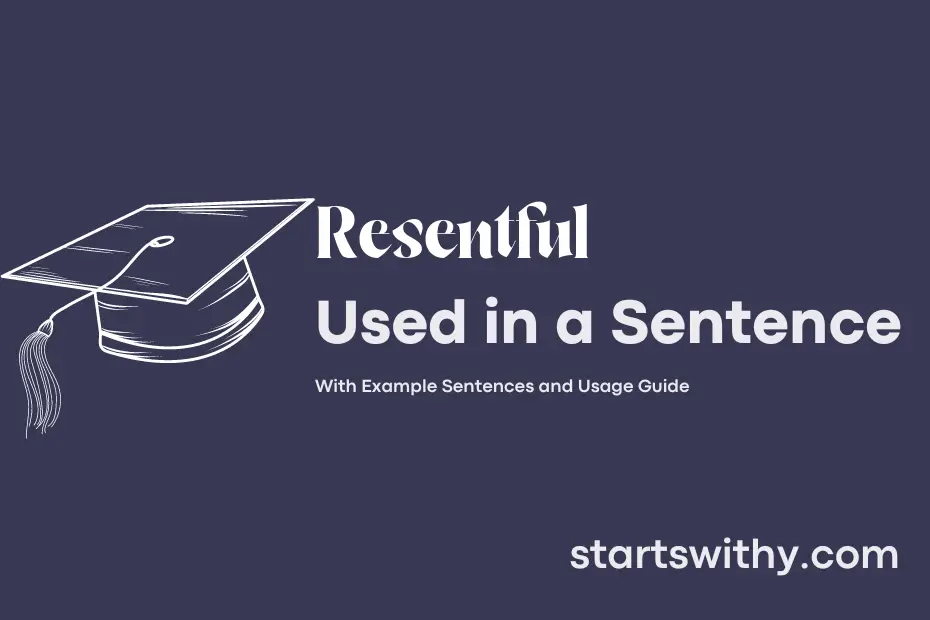Have you ever felt resentful towards someone? Resentful is a word that describes a strong feeling of bitterness or anger towards someone or something, often due to unfair treatment or a sense of being wronged.
This emotion can simmer under the surface and impact relationships, leading to tension and conflict. Learning to recognize and address feelings of resentment can be crucial in fostering healthier interactions and promoting personal well-being.
7 Examples Of Resentful Used In a Sentence For Kids
- I felt resentful when my friend took my toy without asking.
- She was resentful when her brother got a bigger piece of cake.
- He was resentful when he had to share his crayons with his classmate.
- The girl felt resentful when she was not picked to play with the ball.
- I became resentful when my sister got a new bicycle and I didn’t.
- He felt resentful when his friend didn’t invite him to the birthday party.
- She was resentful when her brother got a new storybook and she didn’t.
14 Sentences with Resentful Examples
- Resentful of the early morning lectures, some college students struggle to stay awake in class.
- She felt resentful towards her classmates for not including her in their study group.
- The students became resentful when they discovered that the deadline for their project had been moved up.
- Resentful of the strict attendance policy, some students felt trapped in their classes.
- He couldn’t help but feel resentful when his friends went out partying without inviting him.
- The constant pressure to excel academically left many students feeling resentful towards their professors.
- She became resentful of her roommates for constantly borrowing her things without asking.
- The lack of transparency in the grading system left many students feeling resentful towards their professors.
- Resentful of the lack of facilities on campus, some students voiced their frustrations at the administration.
- He grew resentful of the unfair treatment he received from his professors compared to his classmates.
- She couldn’t shake off the feeling of being resentful towards her parents for pressuring her to choose a specific career path.
- The overwhelming workload during exam season left many students feeling resentful towards the education system.
- Resentful of the high tuition fees, some students struggled to see the value in their education.
- The constant comparisons to their more successful peers left some students feeling resentful of their own abilities.
How To Use Resentful in Sentences?
Resentful is an adjective used to describe a feeling of bitterness or anger towards someone or something, typically stemming from a sense of unfairness or injustice. Here is a helpful guide on how to use this word in a sentence:
- Example Sentence: She felt resentful towards her co-worker for taking credit for her idea during the meeting.
In this sentence, the word “resentful” is used to convey the protagonist’s feelings of anger and bitterness towards her co-worker for taking credit for her idea. The use of resentful helps to paint a clear picture of the emotional state of the character.
When using resentful in a sentence, it is important to consider the context and tone of the situation. The word is commonly used to express negative emotions, so it is best suited for scenarios where someone feels slighted, ignored, or unfairly treated.
To further enhance your usage of resentful, consider incorporating adverbs or adjectives to provide more detail and nuance to your sentence. For instance, you can say “He was deeply resentful of his friend’s success” to emphasize the intensity of the feeling.
Overall, incorporating resentful into your vocabulary can help you effectively communicate feelings of bitterness or anger in various situations. Practice using it in different contexts to become more comfortable with its usage.
Conclusion
In conclusion, sentences with the keyword “resentful” often express feelings of bitterness, anger, or indignation towards someone or something. These sentences convey a sense of deep-seated dissatisfaction or displeasure, highlighting underlying emotions of jealousy, envy, or a sense of being wronged. When used in writing or conversation, sentences with “resentful” typically signify a negative attitude or outlook towards a particular situation, person, or past experience.
Overall, sentences containing the word “resentful” offer insight into the complex spectrum of human emotions, portraying a sense of lingering resentment or disapproval. They serve as a powerful tool for expressing feelings of discontent or dissatisfaction, providing a deeper understanding of the inner turmoil and conflict that individuals may experience in various circumstances.



